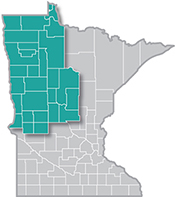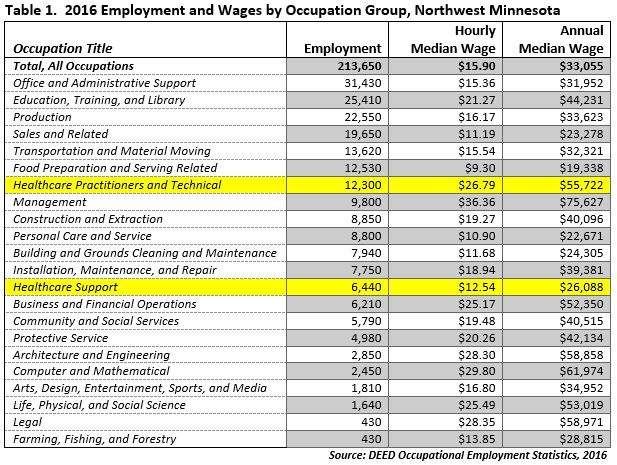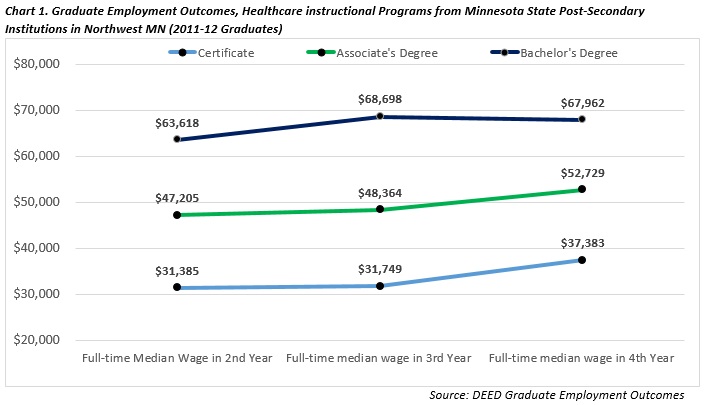 The presence of such industry powerhouses as Polaris, Arctic Cat and New Flyer make Northwest Minnesota a hub of transportation equipment manufacturing.
The presence of such industry powerhouses as Polaris, Arctic Cat and New Flyer make Northwest Minnesota a hub of transportation equipment manufacturing.
From wheat and potatoes to soybeans and sugar beets, the region is a major producer and processor of food staples and specialty agricultural products.
Want the freshest data delivered by email? Subscribe to our regional newsletters.
10/3/2016 12:04:56 PM
Chet Bodin
Northwest Minnesota supports some of the largest health care systems in the state, such as Essentia Health and Sanford Health. There are about 1,450 health care and social assistance establishments in the region – averaging over 25 employees per location – for a total of nearly 36,700 jobs. According to quarterly census of employment & wages data from DEED, the Healthcare and Social Assistance industry employs more workers than any other in the region.
Although some of these jobs focus on administration and other duties besides health care, the industry’s influence means there are a large number of health care-specific occupations. In total, there are over 12,000 health care practitioners in Northwest Minnesota, which include physicians and nurses, and nearly 6,500 health care support professionals, such as certified nursing assistants and dental assistants. Together, health care occupations account for almost 19,000 jobs in Northwest Minnesota (Table 1).

Unlike other top occupations groups like sales and food preparation, health care professions require a wide range of skills and training, and consequently the wages of health care occupations vary greatly. The median hourly wages of health care practitioners ($26.79) are much higher than health care support occupations ($12.54).
For those looking to enter the health care field, education programs in the Northwest region range from certificate programs that train health care support professionals to bachelor’s and graduate degrees in registered nursing. The health care programs at the Minnesota State Colleges and Universities in Northwest Minnesota appear to be leading to higher wages for workers within the field. The employment and wage outcomes of different training programs vary, but post-secondary education appears to be driving wage outcomes above the regional medians, especially for practitioners, technicians and support professionals.
Two years after graduating, the annual wages of 2011-2012 graduates were higher than the median regional wages today, and increased even more by their fourth year in the workforce. Certificate holders who found full-time, year-round work – often in health care support positions – had a median wage of $31,385 two years after graduating, which was over $5,000 more than the median annual wage for health care support occupations in Northwest Minnesota.
Bachelor’s degree holders from health care instructional programs earned a median wage of $63,618 two years after graduating when working full-time and year-round, far exceeding the median annual wage of all Healthcare Practitioners and Technicians in the region, which was $55,722 in 2016. Although these outcomes include graduates employed throughout Minnesota, including the Twin Cities, Northwest Minnesota was the top region of employment for these graduates (Chart 1).

Graduates who earned associate degrees also enjoyed positive labor market outcomes. Their annual wages were almost an exact mid-point between certificate and bachelor’s degree holders. In addition to competitive wages, associate degree graduates are likely to complete their schooling with less education debt than higher-level health care practitioners such as doctors, which would free up more of their income.
Overall, all three award types from health care instructional programs at Minnesota State Colleges and Universities in Northwest Minnesota are leading to excellent outcomes for local students, and are preparing an educated workforce to maintain a strong health care industry in the region.
Contact Chet Bodin.